Linda Rodriguez's Blog, page 7
April 22, 2016
National Poetry Month--Coyote at the Poetry Reading
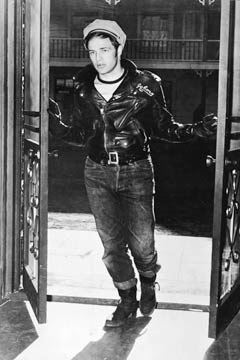 Today's poem is the third in my sequence of Coyote poems for #NationalPoetryMonth. "Coyote at the Poetry Reading" was written later in the series, although in the narrative sequence, its place comes much earlier near the beginning.
Today's poem is the third in my sequence of Coyote poems for #NationalPoetryMonth. "Coyote at the Poetry Reading" was written later in the series, although in the narrative sequence, its place comes much earlier near the beginning.As a poet who's done hundreds of readings and organized long-running poetry reading series for many years, it was a natural for me to write a poem putting Coyote in that environment, especially because there are poets who try to pretend to be like Coyote, wearing their expensive, tailored leather jackets and flaunting their Ivy League degrees (as they pretend to scorn all such things). The thought of setting the real deal up against such pretenders and other cabals on the poetry circuit was irresistible.
Of course, all the black-leather bad boys of film, television, and literature owe their genesis to Marlon Brando's masterful performance in The Wild One. So here's a photo of the grand old original.
COYOTE AT THE POETRY READING
He walks in late,of course,and sits in the back roweven though he’s on the program.Coyote wraps a stormaround him like a protective shield, wears his leather like armor, stares the woman in business suitand her partner in high-style casualinto dropping their eyes. Coyotemakes everyone nervous.
Whispers circle the room.Who asked him to read?“Must have been some woman,”one bearded man says, with a sniff.“A guy would have known better.”“Probably thinks it’s some kind of slam,”one professor tells another.
When they call his name,Coyote stalks to the podiumand growls into the microphone,while, around the room, the airburns with after-lightningozone and smells of bloodand splintered bones.
Published in Heart’s Migration (Tia Chucha Press, 2009)
Published on April 22, 2016 04:00
April 21, 2016
National Poetry Month--Appointment with Coyote
 I must confess I’ve always had a fascination with the bad boy in literature, TV, and film. I know it’s not healthy, but judging by the sheer number of bad boys in fairy tales, literature, movies, and television, it must be pretty common.
I must confess I’ve always had a fascination with the bad boy in literature, TV, and film. I know it’s not healthy, but judging by the sheer number of bad boys in fairy tales, literature, movies, and television, it must be pretty common.I have been fortunate enough to have been married to two of the nicest men in the world, my late first husband and my current husband, but before and between them, I had the most lamentable taste in men. I blame it on all the reading I did as a child. The bad boys were always the most interesting guys.
All this may explain why, over the years, I've written such a number of Coyote poems, and why they seem to form a narrative arc.
APPOINTMENT WITH COYOTE
Coyote showers, shaves, slathers muskwhen he knows he will see her. On Wednesdays,ten is a sacred hour.He always wears something newwhen she comes for her appointmentto see if she will notice.Nights fill with Wednesdaymorning dreams,but the empty days go on—all but hers, when he becomesfor fifty minutesstrange, compelling beast, sexual being.Coyote sees it in her eyes, the way she drawsunconsciously near, the sudden awarejerk backwardsthat must have been the apple’sconsequence in Eden.
The things he could make her feel, she fears.
This morning her old car refusesto start. Coyote drives her home, thighs one hand apart. Filling the airwith her fragrance, she pretendsnothing joins them. Coyote fearslosing control in the sleetand sliding into some fiery collisionbefore he reaches her door,then races skidding away in the ice.
Tomorrow, her husband will buy her a battery.
Published in Heart’s Migration (Tia Chucha Press, 2009)
Published on April 21, 2016 04:00
April 20, 2016
National Poetry Month--Three O’Clock in the Morning, Alone
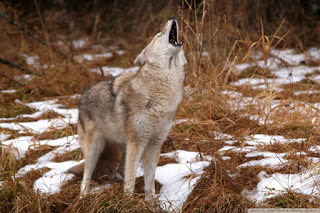 I have written a sequence of Coyote poems, imagining the trickster Coyote manifesting as an avatar in human form. In these poems, I see Coyote as the archetype of all the "bad boys" of literature, film, and television--Bluebeard or the Beast in fairy tales, Heathcliff, Marc Antony, Marlon Brando in On the Waterfront, James Dean in Rebel Without a Cause, and Spike in Buffy the Vampire Slayer. I've always been secretly drawn to these dark antiheroes, and judging by the sheer number of bad boys in fairy tales, literature, movies, and television, so are many others.
I have written a sequence of Coyote poems, imagining the trickster Coyote manifesting as an avatar in human form. In these poems, I see Coyote as the archetype of all the "bad boys" of literature, film, and television--Bluebeard or the Beast in fairy tales, Heathcliff, Marc Antony, Marlon Brando in On the Waterfront, James Dean in Rebel Without a Cause, and Spike in Buffy the Vampire Slayer. I've always been secretly drawn to these dark antiheroes, and judging by the sheer number of bad boys in fairy tales, literature, movies, and television, so are many others.The poems I've written about Coyote have been some of my most popular poems. I even have a whole group of female fans in the UK just for the Coyote poems. So I thought I would post a Coyote poem each day for the next ten days in sequence, sort of a serialized chapbook of Coyote poems. Here is the first.
THREE O’CLOCK IN THE MORNING, ALONE
Coyote wails in the far fieldbeside his woods.He runs yelping,baying among the trees,hot on your trailacross farms and highways,down city streets to prowloutside your triple-locked doors.
Coyote could splinterthat wood, shatteryour windows, plungeinto your life, drag youto his den.He will be civilized instead,phone you in the morning, pretendhe has left a book behind.
Coyote moves backinto his woods, voicefading.He dials your numbernow, growls into your sleepy ear.
Published in Heart’s Migration (Tia Chucha Press, 2009)
Published on April 20, 2016 08:24
April 13, 2016
Poem for National Poetry Month--"Storm Son"
 With all the turmoil and political posturing toward more war while we're yet engaged in a continuing war for the longest time in our nation's history, I thought I would post this poem I wrote when my oldest son's unit was called up, and he was pulled out of his freshman year in college for Desert Storm. He's older now, running a successful business of his own after earlier years of detour caused by this interruption in his higher education, but I remember vividly how I felt when he was called to go to a war many of us believed was unnecessary.
With all the turmoil and political posturing toward more war while we're yet engaged in a continuing war for the longest time in our nation's history, I thought I would post this poem I wrote when my oldest son's unit was called up, and he was pulled out of his freshman year in college for Desert Storm. He's older now, running a successful business of his own after earlier years of detour caused by this interruption in his higher education, but I remember vividly how I felt when he was called to go to a war many of us believed was unnecessary.STORM SON
I almost died giving him life,bled on the table for an hour afterhis head forced its way out between my legswhile they wheeled me to the delivery room.In fifth grade, he played football, youngeston the field, punched holesin the line of defensetill they tackled him and kicked in his ribs.At sixteen, two men mugged himon payday. He slugged the onewho took his cash. The otherslashed his arm openbefore they fled. Dripping blood,he woke me to take him for stitches.
He joined the Reserves, like most of the otherson the Fast Track in his AIT,for college money, poor man’s financial aid.Before he joined, we talkedabout war. Lifelong activist, I warned himthey’d call and he’d have to go.He wasn’t gung-ho, just willing to paythe price to go to school.
When he entered college last semester,I watched him discoverlearning’s delights. He planned to applyfor scholarships, decided he wanted to teachphysics, just startingto do what I alwaysknew he could. Nineteen, he looks twenty-fiveto strangers who think he’s my brother.To me, he stilllooks too damn youngto kill or die in the desert.
Published in Heart’s Migration (Tia Chucha Press)
Published on April 13, 2016 08:14
April 6, 2016
Poem for National Poetry Month--Oklahoma Poem
 I'm just back from the AWP (Association of Writers and Writing Programs) 2016 national conference in Los Angeles. While there, I gave a reading and saw many old friends and colleagues, starting collaborations on several new projects.
I'm just back from the AWP (Association of Writers and Writing Programs) 2016 national conference in Los Angeles. While there, I gave a reading and saw many old friends and colleagues, starting collaborations on several new projects.One of the things I most enjoyed was a Friday evening spent with several much-loved people and ending in a long conversation with Jeanetta Calhoun Mish about Oklahoma and the Oklahoma literary scene. Jeanetta is the director of the Red Earth Low-Residency MFA Program at Oklahoma City University and the founding editor of Mongrel Empire Press.
Our long, fruitful discussion left me homesick for Oklahoma, so my first poem on here for National Poetry Month is a poem for Oklahoma.
Please notice that the word, "squaw." is used in this poem as the pejorative utterance of a self-hating Indian man, my father. This word is always an insult, and I don't want anyone feeling that, because it was used in a particular context in this poem, that it's an okay word to use to refer to Indian women. It definitely is not.
OKLAHOMA POEM(for Jim Barnes)
In his first words, I can hear Oklahoma,the hill country way back behind his talkabout teaching French literature in translation,as if I have gone home, drifted backthrough all the years to that childhood place I fled.
I have described it to othersas the armpit of the nation,when I was young and not long freeof its windy roads and redbud trees and overgrownhills, still hurt and bitterabout things Oklahomahad little to do with,beyond being the last place to standfor a people and the place where one of themwas born and the place where he lefthis wife and kids. The last two events werewhat ate at me, and they could have happened anywhere.
Only the first was uniqueto Oklahoma, the old Indian territorywhere my ancestors limped off the Trail of Tearsto join other tribes forced from their homesby other ancestors of mine,founded the Cherokee Female Seminaryat Tahlequah and a newspaperall over again, were finally forced to give up their landsso rich ranchers could take the best partsof the reservation and leave the hilly, scrub landsto my great-grandparents, great-aunts, grand-uncles,and Grandma.
What does any of this have to do with me nowall these years and miles away?Me, with the broad squaw face,as my self-hating father, from whom it came, called it?When I hear Jim say about Oklahoma(as one refugee to another), “We both got out,but it’s still inside—it settles in you,”I know he’s right, Oklahoma in more than his voice,in the way he makes light of misfortune,in his penchant for poking funat pretensions, his own and others’.Oklahoma’s settled in us both.And through the echoes in his voice of its turtledovesand winds and sky that could pull you off your feetinto infinity if you didn’t have troubles to weigh you downto the earth, I make my peace with itand come home.
Published in Heart’s Migration (Tia Chucha Press, 2009)
Published on April 06, 2016 09:44
March 29, 2016
Casual Guidelines for Mystery Writing
 I’ve read a lot of lists of rules for mystery writers. Everyone wants to tell us what to do, but I’ve discovered by reading through these lists that large swathes of them are either misguided or simply false. So this is my set of casual guidelines for mystery writing—to steer you in the right direction but also to remind you to think for yourself.
I’ve read a lot of lists of rules for mystery writers. Everyone wants to tell us what to do, but I’ve discovered by reading through these lists that large swathes of them are either misguided or simply false. So this is my set of casual guidelines for mystery writing—to steer you in the right direction but also to remind you to think for yourself.The plot is not everything in mysteries, as so many of these lists of rules say. Just having a lot of action or clues and red herrings doesn’t make a good crime novel. The best plots rise out of character. Dive deep into your major characters and discover their motivations and their secrets. Your best plot with all its twists and turns will come from the fears, desires, and manipulations of your characters and how many of them are at cross-purposes with each other.
Introduce both the protagonist and the antagonist early on. This is important—for any novel. The reader needs to know with whom to identify and who is threatening whatever that protagonist with whom he identifies is trying to achieve.
The crime needs to be a major crime, preferably murder, but there have been successful mysteries written around art heists, con schemes, and other crimes. In Gaudy Night, Dorothy Sayers even wrote one of the classic novels in which only anonymous letters and vandalism occur. You must simply be able to make it of absolute importance to the protagonist and to the reader. Murder is not required—it’s just easier.
The crime and its solution should seem believable. The reader must be able to believe that the antagonist could commit whatever heinous crime you’ve given him and that the protagonist could solve it and overcome him. Physically, intellectually, and emotionally, the crime must seem possible to the reader without giving either the villain or the hero superpowers.
And as a corollary to this—you must motivate your villain. Because he or she is pure evil or stark raving mad is not a good reason to break major societal taboos and put himself or herself in danger of life in prison or the death penalty. As much as you motivate your other characters to make them believable, so much must you motivate your antagonist to make a credible threat. The more complex and motivated the villain, the more memorable and fascinating.
One of these rule lists sets as an adamant, must-obey rule that your narrator or detective must never commit the crime. Hello? Does anyone remember a little-known writer like Agatha Christie who violated that rule in three different, very successful books? If you want to make your narrator or detective commit the crime, you will have to be fiendishly clever to pull it off, but if you are and can, go for it!
One of the rules in almost every list that I will agree with is the admonition to do your research. I know a writer who came from another genre to mystery and doesn’t like research so he makes things up. That will come back to haunt you in mysteries. Mystery readers expect and demand good research so that they can stay in the fictive dream. They will chastise you in a minute (and rightly so) if they catch you in a factual error—and there is always someone, and usually more than one, who will catch you. On the other hand, they reward those who research and use it well with great loyalty. Do your research and learn how to use it so it doesn’t stop or slow the story.
So, these are my casual guidelines for mystery writers. Nothing is written in stone. Every writer is a different situation. Some may even be able to introduce protagonist and/or antagonist over halfway through the book. I know I couldn’t, but that doesn’t mean you can’t. It’s just much easier to keep your reader’s interest, however, if you introduce them both in the first few chapters. Every other guideline I’ve given is the same. Perhaps you are so brilliant at making things up that no one will ever question your lack of research. I wouldn’t count on it, but it’s always possible. Use these as guidelines for your own judgment. Ultimately, it’s your book. You are the creator and need to do it your own way. Just make sure that your readers will follow you along your book path.
Published on March 29, 2016 09:08
December 24, 2015
CHRISTMAS EVE MEDITATION WHILE WAITING TO PAY--A poem for Christmas
 Happy Winter Holidays and Merry Christmas (if you celebrate it) to everyone who reads this!
Happy Winter Holidays and Merry Christmas (if you celebrate it) to everyone who reads this!This is a photo taken by Sue Wyatt Shinkle of Kansas City's famous Plaza lights at Christmas time right before a winter storm hit. When my kids lived in other states but came home for Christmas, they always said the sight of the Plaza lights let them know they were really home.
CHRISTMAS EVE MEDITATION WHILE WAITING TO PAY
Standing in shopping-center lines,I remember last Christmas in your arms.I dream your voice on the phone at midnight,asking to come home,how I will unlock the doorto admit you from the black coldand hold you,chilled and shaking from somethingdeeper than cold.I dream youon your knees, how I willdrop to my own and join you.
A tightmouthed woman behind mejabs my back with a box corner,and I step forward,one person closerto paying for what I want to give.
Published in Heart’s Migration (Tia Chucha Press, 2009)
Published on December 24, 2015 08:58
December 7, 2015
COYOTE WINTER--A Poem for December
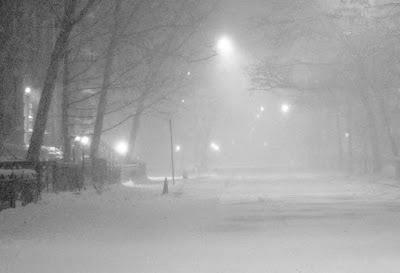
COYOTE WINTER
The wind wolf swoops down
on this city again tonight,
and if the snow it throws
across lit streets
and whipping trees outside
my second-story window
doesn’t make a blizzard in full cry,
it won’t be for want
of howling.
One lone shadow man
struggles up the steep street
toward the bus stop.
Why is he out in this
alone?
Where are you?
Published in Heart’s Migration(Tia Chucha Press, 2009)
Replies to Comments (because Blogger still hates me):
Reine, I'm glad I was able to make you feel the winter chill. xo
Lil, thank you. That's quite a compliment for a poet.
Thank you, Elizabeth. That's one of the things that I hoped to do with this poem.
Published on December 07, 2015 18:42
December 3, 2015
The Red Bird All-Indian Traveling Band by Frances Washburn—Books of Interest by Writers of Color
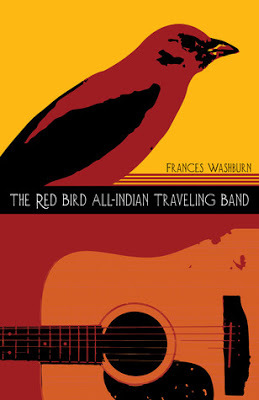
The engaging protagonist of Frances Washburn’s novel, The Red Bird All-Indian Traveling Band, Sissy Roberts, a self-aware and sassy young Lakota waitress, lead guitarist, and singer for the eponymous band, is beautiful and smart. Sissy is also gifted (or cursed) to have people confide all their secrets to her, whether they want to or not and whether she wants to hear them or not. Sissy graduated from high school four years earlier and wants to find a way to leave the reservation to go to college and avoid the common fate of her pregnant and unmarried friend, Speedy, who lives with Sissy and her family.
Part tightly paced mystery, part humorous, affectionate community chronicle, Washburn’s third novel takes place on the Pine Ridge and Rosebud Reservations in South Dakota and begins on Fourth of July 1969 when a hail of beer bottles chases Sissy and the guys in the band out of the Longhorn Bar in Scenic where they are scheduled to play. That same night, Buffalo Ames is murdered outside the Longhorn, drawing Tom Holm, an FBI agent, toward Sissy with her talent for hearing secrets as his unwilling entrée into the close-knit and suspicious reservation community. The book ends four months later after much romantic and other intrigue and after many of Sissy’s friends and loved ones have become suspects in the murder at one time or another before she solves the crime.
Rich in particulars of reservation life and unforgettable characters, Washburn creates a believable, well-drawn world in which she sets her emotionally complex story of the coming of age of a young woman with the gift of being a receptive listener who pays real attention to what people tell her and the truths behind what they say and the story of a downtrodden, complicated community in a pivotal time, forming and reforming itself. Washburn’s pared-down style is ironic and taut and, even when venturing into tragedy or love, never touches on sentimentality. This richly textured novel of a strong young woman’s and her community’s development and self-determination is a fine literary work with interlocked stories and telling details that bring Sissy and her world to life on the page.
As always, I suggest that you buy the book from the university publisher and support the publishers who bring you diversity in literature. Without university and small press publishers, we would have only the few most famous writers of color, and even they were usually initially published by the university and small press community.
http://www.uapress.arizona.edu/Books/bid2476.htm
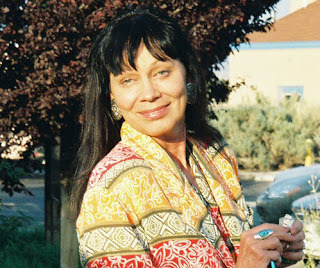
Bio Frances Washburn was born on Pine Ridge Reservation in South Dakota and grew up there. She earned her Ph.D. from the University of New Mexico and was a visiting professor at the University of Nebraska before being hired at the University of Arizona where she is an Associate Professor in the American Indian Studies Program and the Department of English. She is the mother of two children, Lee and Stella.
Washburn is the author of the novels, Elsie's Business and The Sacred White Turkey, in addition to The Red Bird All-Indian Traveling Band. She has also published a biography of Louise Erdrich, Tracks on a Page: Louise Erdrich, Her Life and Works, as well as scholarly and academic articles and essays.
Published on December 03, 2015 14:14
November 27, 2015
WHERE I COME FROM: Final poem for Native American Heritage Month

My dear friend, poet Levi Romero, turned the poem, "Where I'm From" by George Ella Lyon, into a writing exercise that I, along with many others, have used in writing workshops, especially with young people. One day, while teaching, I wrote my own poem based on this writing exercise.
WHERE I COME FROM
I come from crocheted dishragsand hand-me-down clothes from cousins on the “good” side of the family.I come from canvas cotton sacks (200 pounds for an adult “but you’re a big girl now, eleven, you can pull enough cotton to fill that ol’ sack”),from Lifesavers and Nehi Orangeand salty peanuts dropped into sweating-cold bottles of RC Colaand traded among us kids for back rubswhen we couldn’t quite stand up straight after a day in the cotton rows.
I come from the heady, dangerous ozone smell of summer thunderstorm nightswhen I walked alone across town to buy my mother’s cigarettes.I come from rain-soaked redbuds and lilacs and irises, from mesquite and cottonwoods,from beachfront bougainvillea and date palms.I come from drive-in movies and drunk fathers and mothersand singing in the church choirand stone-headed stubbornness.I come from Sequoiah and John Ross,from “Cielito Lindo” sung everywhere(I thought to me since it had my name in it),from driving out in the dark to see the desert bloom after a rain, from altruism and diabetes.
I come from “get your nose out of that book”and “if it’d been a snake, it’d bit me”and Grandpa’s sermons in the pulpit on summer Sunday visits.I’m from the Great Smokies and Tahlequah and Broken Arrow,from Highland crofts and Dublin slums and England’s younger sonsfrom San Diego and Coronado and El Cajon,I come from snobdodgers and frybread for breakfast and from fried chicken I helped kill and clean for Sunday dinner.I come from the month the money ran out, even my illegal paycheck from the drugstore after school,and the grocer wouldn’t give more credit, when some angel left a bushel basket of turnips on our kitchen doorstep.
I come from Aunt Joan and Uncle Glyn on their dirt-poor farmwho took us in on a moment’s notice, six kids deserted by both parents,and raised us with our four cousins in that house the size of my living room with never a cent or a thank-you.I come from those nights on the mattress on that kitchen floor,waking to take little ones to the outhouse in the dark,from cooking for harvest hands and combine crews while Aunt spent the day on the tractor with the men,from her dark Indian spitfire and his tall, Indian peace.
I come from all the photos of us kids in places all over the countrywhere Dad dragged us around like a tail behind him,from all the photos of the five babies after me and the photos of all of us with grandparents and cousinsand my school photos from San Diego, Kenosha, Arlington, and so many others I don’t even remember,stored only in my brain, except for the handful Aunt Joan saved for me all those years until we found each other againwhen Uncle Glyn was dying in his quiet wayand cousin Dickie’s abused son, raised by his grandparents,bussed and hitchhiked back from the Navy to sleep on the floor at the foot of Uncle’s bed, faithful hound.
I come from my grandmother’s Cherokee teaching stories and stubborn strength,from that grandfather’s wild goose chases and big dreams and fine talk,from my other grandmother’s domestic fussing and ambitious nurturing,from that grandfather’s preaching and Bible values,from my father’s hatred of his Indian half and tolerance toward everyone else,from his bright, inquiring mind, his hope for humanity, and his drunken violence,from my mother’s cold beauty and rewriting of the past, from the short tragedy of her life, and the strength with which she bore it.I come from a long line of male preachers and teachers, drinkers and dreamers,from conjure women, curanderas, women with the Sight, and women who survive and make do.I come from fallen gentry and half-breed hill trash, from parsonages and trailer courts.I contain all of these, and I choose, I say, who I will be.
(published in Imagination and Place: An Anthology, 2009)
Published on November 27, 2015 20:00



